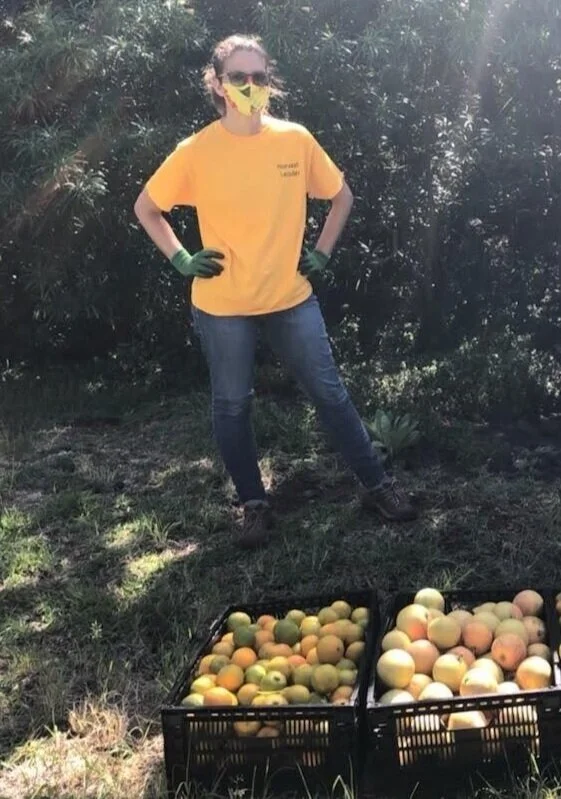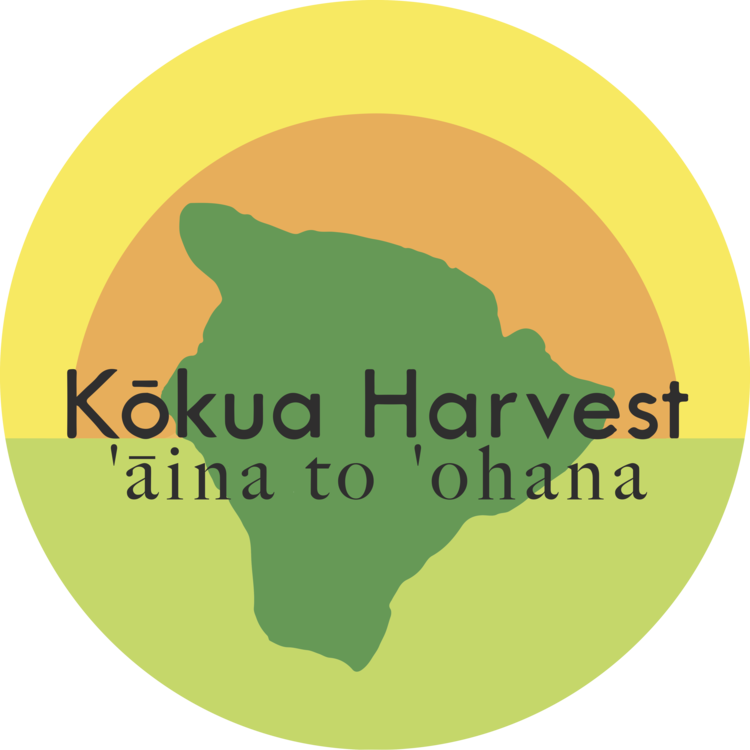Career Conversation: Lisa DeSantis of Hawai'i Public Health Institute & Kokua Harvest
CAREER CONVERSATION #1:
LISA DESANTIS
HAWAI'I PUBLIC HEALTH INSTITUTE & KŌKUA HARVEST
Kicking off our first “Career Conversation” is Lisa DeSantis, who generously did two interviews for her two positions. She is a perfect example of a non-traditional career path.
Currently, Lisa works for the statewide nonprofit health hub Hawaiʻi Public Health Institute(HIPHI) as the West Hawaiʻi Community Coordinator, working primarily on the Tobacco-Free Hawaiʻi Island Coalition and the Healthy Eating +Active Living (HEAL) program. She is also The Food Basket’s program coordinator for Kōkua Harvest, a program that coordinates volunteer harvests and donations of excess local produce.
Hōkūpaʻa invited Lisa to chat because of growing public interest around the importance of sustainable food systems and public health. Lisa is passionate about the importance of these intertwined systems, and also shares Hōkūpaʻa’s mission for engaging and empowering youth to sustain their communities.
LISA’S PATHWAY
Lisa didn’t originally plan to work in public health or food systems. She thought public health would involve telling people what to do without the chance to connect with them directly. Food systems work was not considered, either. Like many people, Lisa thought, “If you’re not a farmer, what else is there?”
Lisa started out on a different career pathway that eventually led her to the important work she does here through “a combination of luck and dedication.” After completing a degree in film production and finding employment within that field, Lisa began a shift in priorities. It began with confronting the realities of waste in film production, which led to working on minimizing environmental impact from film sets. This position allowed Lisa to remain in the film industry while maintaining her values. However, it still didn’t feel right, and the long days were taking a toll. Feeling ready for a change, Lisa took her first foray into the food systems world: a job on a farm that produced beautiful vegetables that unfortunately never made it to less-affluent neighborhoods. This sparked an interest in food systems justice.
Lisa wanted to do more, and after years of consideration and experience, now she knew where she wanted to make a sustainability impact: agriculture. AmeriCorps gave her the opportunity to work on a program promoting fresh produce accessibility for those receiving SNAP benefits.
AmeriCorps positions are temporary, so Lisa found herself unsure what to do next, but confident at last about what kinds of opportunities would be a good fit. She took what she had learned about her career desires and pursued a purposeful search.
Lisa tabling for the Coalition for a Tobacco-Free Hawai‘i
Lisa poses with a donated fruit harvest
Lisa was a key member in the partnership team that developed Kōkua Harvest, and she currently runs the island-wide gleaning program in her spare time. Almost a year after starting Kōkua Harvest, Lisa began a full-time position as West Hawaiʻi Community Coordinator with HIPHI -- a job she thought she would not get without a public health background. As it turns out, public health is broader than Lisa originally thought, and her unique skills and experiences made her an attractive applicant. She views this position as a chance to contribute to the community through preventative health efforts. It is not uncommon to hold two (or more) positions simultaneously, and Lisa has found that both on-the-ground, direct services and working on policy, systems, and environmental changes are all important to addressing community and systems-wide challenges.
WHAT’S IT LIKE BEING A COMMUNITY COORDINATOR FOR HIPHI?
COVID-19 has affected the majority of her time in this role; it is an unusual time to be a community coordinator when it is tricky to get into the community. Lisa’s work as a community coordinator involves multifaceted, collaborative, efforts to make positive changes in policies, systems, and the environment. She often works with partners (like Hōkūpaʻa!) as well as the community on projects that benefit public health. She is most active in HIPHI’s Tobacco-Free Hawaiʻi Island and Healthy Eating + Active Living programs. Every day she gets to work toward building shared capacity for a more connected, healthier Hawaiʻi Island.
What does this look like in day-to-day activities? It depends! Writing, attending and facilitating meetings, gathering data and testimonies, keeping project records up-to-date, reviewing policies, creating social media content, event planning, and more. Most projects require a diverse set of skills, outside-the-box thinking, and close coordination with partners.
WHAT’S IT LIKE BEING A PROGRAM COORDINATOR FOR KŌKUA HARVEST?
Program coordinating for Kōkua Harvest means strategizing with site owners on when is best to harvest their produce, scheduling and coordinating between site owners, volunteers, and distribution partners, and engaging the community by keeping them informed on and involved in what we’re working on.
WHY SHOULD SOMEONE SEEK A CAREER IN PUBLIC HEALTH OR FOOD SYSTEMS?
Both fields are important to improving peoples’ lives, and we need more people ready to work on these interlocking systems. Hawaiʻi Island needs dedicated, community-minded people that want to invest in growing the island in a positive direction through all kinds of jobs.
CAREER EXPLORATION ADVICE
As Lisa’s story demonstrates, you may end up in careers you never seriously considered. The skills gained from different work experience provide a unique amalgamation of experience you can draw on to apply to your professional and personal lives alike. It’s important to be open to learning and taking unexpected pathways.
Lisa constantly uses her film industry experience in her work: both creative and people skills...but mostly the people skills. From her experience with large film crews, Lisa learned how to work with a wide range of personalities, and such skills as scheduling, management, organization, teamwork, and communication, remained important throughout her career. Another big lesson taken from her first career phase was accepting the need to trust others to do their job right.
It’s also important to take the time on your own to improve your skills and expand your knowledge around subjects you care about, even if it doesn’t seem to have a direct relation to your chosen career path. As Lisa puts it, “You will find the niche that only you and your specific, unique skillset can fill.”
JOB-HUNTING ADVICE
Where should you start? Lisa suggests finding an organization that does work you are interested in. Ask what kinds of careers they have and what they look for in applicants. You can also ask about volunteer, internship, apprenticeship, or entry-level work opportunities to get you started.
When looking at job postings, don’t just skip to the requirements. Read everything and try to get an idea about the workplace climate and what kind of people would fit in well. Volunteering could also help you make connections and see if the workplace culture is a good fit for you.
When you do make it to the interview stage, remember that you are also interviewing the employer. Ask questions that provide context to help you decide if the organization is a good match.
Remember that following all the advice doesn’t always work -- though it does work for some! Don’t get too hung up on finding “the right” pathway. Be open to choosing your next step based on what is right for you at that time, even if it doesn’t match what you originally planned.
Lisa believes young people are willing to learn and try new things -- to be multifaceted. This attitude will be a huge asset in their pursuit of fulfilling careers. She advises those starting out to take all experiences as a chance to learn something, and your resume (and life!) will be richer for having a diversity of experiences. The expectation that someone should do one job for 50+ years until retirement is gone. Lisa thinks it is time to see that shift as a benefit. Don’t be afraid to change jobs or change fields. You don’t need to know exactly what you’re going to do for the rest of your life. Find something you enjoy, do the research, and put in energy. The rest will follow.
ADVICE FOR EXPLORING CAREERS IN PUBLIC HEALTH OR FOOD SYSTEMS
First, know what you’re aiming for! (Or do more research to get a better idea of what you do or do not want to do). If you’re interested in an aspect of public health or food systems, research career options and look at what employers are seeking. You can also utilize local websites like Hawaiʻi Career Explorer or Hawaiʻi Career Pathways.
Depending on what you want to do, you may not need a public health degree to work in public health. Figure out what makes sense for the career you want. One way to do this is to look at job postings that you’re interested in and check the requirements and desired qualifications. It’s also a good idea to keep checking periodically after getting a job so you can keep up. You also might want to keep one step ahead so you can prepare for your next career move.
There are many degree and certification options within the University of Hawaiʻi system, with campuses in West Hawaiʻi (Pālamanui), North Hawaiʻi (Ko Center), and East Hawaiʻi (Hawaiʻi CC, UH Hilo) as well as Hawaiʻi Pacific University. UH West Oahu has a specific program on sustainable food systems. Hōkūpaʻa can help you get connected to counselors for these campuses if you want to drop into our open office hours.
HIPHI also has an awesome internship program to help get you started.
HOW ELSE CAN YOU AFFECT PUBLIC HEALTH AND FOOD SYSTEMS?
You don’t need to work in public health or food systems to be informed and help out. Lisa encourages you to learn on your own and find out how fun self-directed learning can be.
You can start small in taking action, just by influencing and serving the “pod” of people who know you. You have great influence in your social circles. Big changes start with people starting to care and share ideas.
GETTING INVOLVED AND GETTING CONNECTED
HIPHI’s Hawaiʻi Youth Food Council brings on new students annually and provides a chance to work with a statewide coalition of youth and allies.
Contact Rie Kuhaulua at Rie@hiphi.org about HIPHI internships. The program strives to treat interns like professionals. Interns receive direct mentorship and they work on projects in their sector of interest: Healthy Eating + Active Living, Coalition for a Tobacco-Free Hawaiʻi, or Hawaiʻi Farm-to-School Hui.
The Food Basket is always looking for volunteers; contact info@kokuaharvest.org to volunteer with Kōkua Harvest, or check out other Food Basket volunteer opportunities.
Lisa also suggests checking with schools, resiliency hubs, and other community organizations for opportunities. Find and connect with an organization whose mission resonates with you -- don’t be shy to reach out and ask what they need.
KEEP UP AND STAY CONNECTED
HIPHI SOCIALS:
https://www.facebook.com/hubforhealthHI/
https://www.instagram.com/hubforhealth/
KŌKUA HARVEST SOCIALS:
https://www.instagram.com/kokuaharvest/
https://www.facebook.com/kokuaharvest




